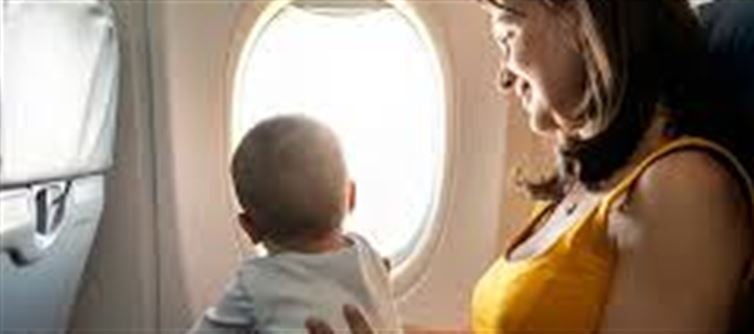
Yes, newborns can get a passport as soon as they are born. There’s no minimum age requirement for obtaining a passport for a child in India. The process is fairly straightforward and can be done either online or offline. This is especially important for families who wish to travel internationally shortly after the birth of their child.
Here’s everything you need to know about getting a passport for your newborn and how they can travel by flight.
1. Getting a Passport for Your Newborn in India
A. Eligibility Criteria
· The child must be an Indian citizen.
· The application can be made by either parent (if the child is under 18).
· The child’s birth certificate is required as proof of age and identity.
· Parents’ passports will also be required as supporting documents.
B. Documents Required
· Child's Birth Certificate: Issued by the local municipal authority or hospital where the child was born.
· Parents' Passport Copies: A copy of the passport for both parents, showing the details (first page with personal information).
· Passport application Form: The form can be filled out online or obtained at your nearest Passport Seva Kendra (PSK).
· Passport Photos: Passport-size photographs of the child (requirements for size and background must be followed).
· Address Proof: The parent(s)' address proof may be required (e.g., utility bills, aadhar card, or rent agreement).
C. application Process
You can apply for a newborn’s passport in two ways:
1. Online Application:
o Visit the official website of Passport Seva Kendra at passportindia.gov.in.
o Fill out the application form online and pay the fee through the portal.
o Book an appointment for the document submission at the nearest Passport Seva Kendra (PSK).
2. Offline Application:
o Visit the local Post office Passport Seva Kendra (POPSK) and submit your documents.
o Complete the application form at the PSK or collect it from the counter.
D. Processing Time
· After submission, it usually takes around 7 to 15 days for a passport to be issued for a newborn, though this can vary depending on the workload of the local PSK.
· You will be notified when the passport is ready for collection.
2. How Do Newborns Travel by Flight?
A. Flight Booking for a Newborn
· Infant Ticket: Newborns are typically considered infants under the age of 2. When booking a flight, parents can book an infant seat, which is usually more affordable than a full child ticket.
· Seating: Infants do not get their own seat unless you book a seat for them. For most airlines, infants travel on the parent's lap during the flight. Some airlines provide infant seatbelts for safety, but they do not get their own full seat unless specified by the airline.
B. Documents Required for Travel
· Infant Passport: A valid passport is required for international flights. Domestic flights may not require a passport for a newborn, but proof of age (like a birth certificate) might be needed.
· Visa (for international Travel): Along with the passport, a visa may be required depending on the destination country. The process for applying for a visa for a newborn is similar to that of an adult.
C. airlines and Infant Amenities
· Infant Bassinets: Many airlines provide infant bassinets on long-haul international flights. These are small beds attached to the bulkhead of the cabin, allowing the baby to lie flat and sleep comfortably. It’s advisable to book a bassinette well in advance as availability is limited.
· Baby Food and Essentials: airlines generally allow parents to carry baby food, milk, and essential items like diapers on board. Some airlines also provide baby food and milk upon request.
· Health and Safety: It’s a good idea to carry medications or a first-aid kit for the baby, especially for long flights. You might also want to check the airline’s health guidelines for flying with infants, especially during the COVID-19 pandemic.
D. Tips for Traveling with a Newborn
1. Ear Pressure: During takeoff and landing, the change in cabin pressure can cause discomfort for newborns. Breastfeeding or giving the baby a bottle can help reduce discomfort by encouraging swallowing.
2. Dress Comfortably: Dress your baby in soft, comfortable clothes to make the journey smoother.
3. Keep Essentials Handy: Ensure you have all the baby essentials like diapers, wipes, bottles, baby food, and extra clothes in an easily accessible bag.
4. Stay Calm: Babies can sense their parents’ stress, so try to stay calm and relaxed during the flight. If your baby cries, it’s often part of the experience, and other passengers are generally understanding.
3. Conclusion
In summary, newborns can indeed get a passport right after birth, and the process is simple. Once the passport is obtained, newborns can travel by flight, though they’ll typically need to be booked as infants and travel on their parent’s lap unless a separate seat is purchased. It’s important to ensure all required documents are in place and check with the airline for specific infant-related amenities to ensure a smooth journey. Safe travels!
Disclaimer:
The views and opinions expressed in this article are those of the author and do not necessarily reflect the official policy or position of any agency, organization, employer, or company. All information provided is for general informational purposes only. While every effort has been made to ensure accuracy, we make no representations or warranties of any kind, express or implied, about the completeness, reliability, or suitability of the information contained herein. Readers are advised to verify facts and seek professional advice where necessary. Any reliance placed on such information is strictly at the reader’s own risk..jpg)




 click and follow Indiaherald WhatsApp channel
click and follow Indiaherald WhatsApp channel